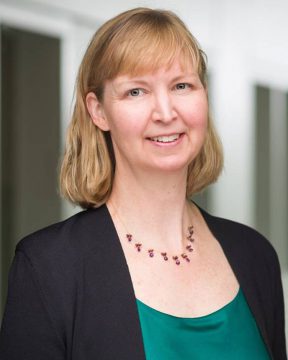Louise Davies, MD, MS, an associate professor of surgery and of The Dartmouth Institute, is one of two Dartmouth faculty to have been named Fulbright Scholars for the 2017-2018 academic year, enabling their planned teaching and research activities abroad. Davies will head to Japan and England to focus on information sharing with patients.

“My initial response was, what have I done?” Davies says. “I spent the first week peeling myself off the ceiling, the subsequent week trying to figure out what we were going to do for my family and work. Now it is beginning to get real and I am starting to get excited.”
Projects supported by a Global Scholar Award must benefit each of the countries to be included, as well as the United States, says Davies. “I am going to Japan for the months of September and October, to work at Kuma Hospital in the city of Kobe.”
The hospital in Kobe has been monitoring small thyroid cancers in patients for the past 20 years, cancers that were picked up incidentally. “Long-term safety data shows that it is safe to monitor small thyroid cancers that are in the right location in the glands, not near any vital structures. Even among the very small numbers that grow a little bit, you can still undergo surgery and remove the cancer effectively,” Davies says. “This is a practice that we would like to see people voluntarily adopt in the U.S., so this would be a good way for me to go and learn from them, to see for myself how the program works.”
Oxford University in England is her next stop. She will be there for March, April, and May of next year. “I will be learning advanced techniques and strategies for using what we call narrative data—patient experiences of illness chronicled with words rather than numbers,” Davies says. “For the last 15 years, the British have been interviewing 50 to 60 people who have all had a particular illness experience, analyzing the data, and creating publicly available summaries about what that experience is like.”
Her plan is to interview patients in Japan who have been part of the thyroid monitoring program, and then, following the Oxford example, use that data to create modules that might be available to the public, to inform their decisions regarding treatment.
“We are very good at counting things and very good at creating statistics to represent different outcomes that people can have after medical treatments,” she says. “However, we are not very good at summarizing and explaining to people what typical experiences of an illness may be. People have demonstrated on the internet that they want that and need that.”
Read original story at News.Dartmouth.edu